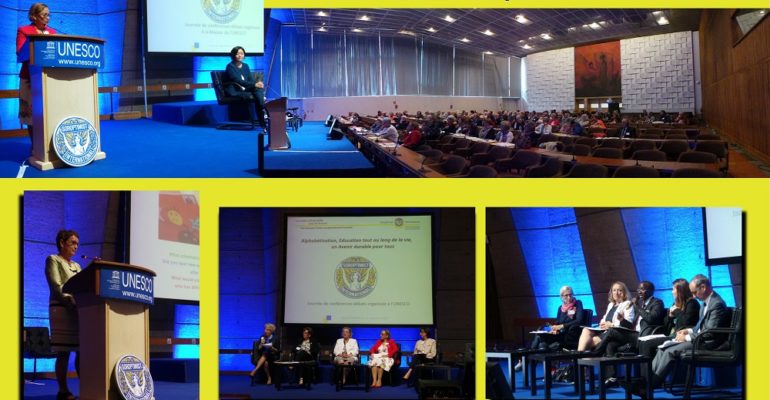On September 11, 2017, Soroptimist International France organised a Day of lectures and debates at UNESCO on the theme “Literacy, Lifelong Learning, A Sustainable Future for All”*
Where do we stand today?
One way to understand today’s reality in the world:
- 263 million children and youth are not in school
- 35% of out-of-school children live in countries affected by conflict or natural disasters, and their numbers are increasing
- 14% of young people, and only 1% of girls, finish high school in low-income countries
- 758 million adults, 2/3 of whom are women, cannot read or write
The programme
UNESCO officials, representatives of several NGOs, including Soroptimist International, ATD Fourth World, New Humanity, BPWI, associations fighting against illiteracy, professional organisations, and representatives of French Ministries participated in 3 round-tables on the subjects:
- What are the main issues of literacy and the fight against illiteracy today in the world?
- What is the real impact of literacy on the economic development of countries?
- How does the NGO Soroptimist International conceive the implementation of the new Agenda for Literacy to defend Peace in the World?
In the course of the various interventions, it was recalled that education is crucial to achieving all of the UN’s 2030 sustainable development goals.
Soroptimists and the fight against illiteracy
Education also has a dedicated objective to “ensure universal access to quality education on an equal footing and promote lifelong learning opportunities“.
That is why Soroptimist International has chosen to invest in education, with a special focus on women and girls.
Education is not only about improving knowledge and skills. It is the very heart of personal and social development. It is a path to a more harmonious, more authentic human development in order to reduce poverty, exclusion, misunderstandings, oppressions and wars. It is a means of establishing relations between people, groups, and nations, and to realise the ideals that are dear to us: human rights, peace, freedom and social justice.
However this access to quality education, which is a human right for all, is far from being achieved. Acting against illiteracy is therefore still imperative and a challenge to be met!
Everyone is literate in the language of Music
A musical interlude with 46 students of the Lycée Franco-Allemand in BUC showed that music binds us together: no matter what language we speak, no matter whether we can read or write, no matter if we can read music or not. From Beethoven to Rock & Roll to rap, music connects.
Closing speech
In her closing speech SI President Mariet Verhoef-Cohen, after thanking SI Union President of France, Evelyne Para, and the two SI representatives to UNESCO, Marie Christine Gries and Rina Dupriet for organising such an interesting day, re-emphasised why the fight against illiteracy is so important for Soroptimist International: As Soroptimists, we focus our work on Sustainable Development Goals 4 – Education, 5 – Gender Equality, and 6 – Clean Water and Sanitation. We believe these goals are linked: there can be no gender equality if both genders are not equally educated, or without clean water. It is when women and girls learn to read, write, do basic maths and use computers, that they are more likely to lift themselves out of poverty. Mariet called the fact that worldwide some 493 million women and girls still cannot read or write ‘literacy injustice’.
Some of the causes of illiteracy amongst women were pinpointed. For example, fetching water is so time-consuming in sub-Saharan countries that girls have no time to go to school, fetching water is considered a girl’s task. Similarly, there are girls who cannot attend school during their periods either because they do not have the means to purchase the necessary products, or because their culture so dictates. These girls end up dropping out of school. SI representatives arrange events across the six UN centres to raise awareness of these issues.
Soroptimist projects combating illiteracy
President Mariet highlighted two successful Soroptimist projects that contributed to the fight against illiteracy, out of hundreds of such projects being implemented right now by Soroptimist clubs the world over.
My Book Buddy provides disadvantaged women and girls with greater access to books by donating bookcases with books for children (aged 6-12) to schools and refugee camps. Teachers are trained to use a library system, allowing children to borrow books and read them at home. This offers the added advantage that other family members can improve their reading skills as well.
The project Syria ‘Back to School’ collaborated with UNICEF to assist in the refugee crisis. The project increased access to education for children in refugee camps in Turkey by creating extra learning spaces: 22 classrooms and 11 container classrooms were built. Teaching materials, teacher training, school supplies for 1,250 children, and furniture for 15 school buildings were provided. Over 16,000 children have benefited.
Mariet reminded the audience that these hundreds of millions of illiterate women are not all in far away and poor countries. In France alone 7% of the population, or 2.5 million people, lack basic knowledge of reading and writing. They cannot read simple notifications, medical instructions, or community notices. They feel ashamed and don’t tell anyone, sometimes not even their own family. As they have been to school, people around them think they can read. 51% have a job, but 71% speak at a level of a 5-year-old and most live in rural communities. They spend most of their adult life ‘getting by’ or avoiding situations where they could be exposed. Mariet continued, each and every one of us must know such people without realising it. Let us ask ourselves on an individual basis “What can I do to help someone who has difficulties reading and writing?”.
Evelyne Para
Présidente SI France 2016-2018
* a report on the day will soon be published on the website of SI France www.soroptimist.fr

